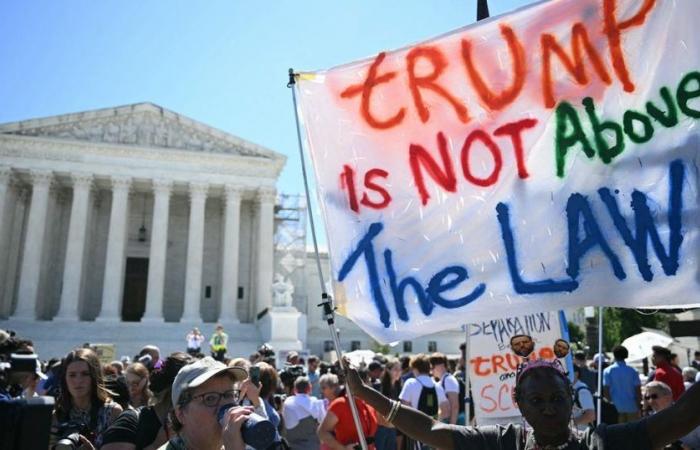The conservative-majority U.S. Supreme Court ruled Monday on whether to extend the president’s criminal immunity. By a six-to-three majority—conservative justices versus progressives—the Court ruled that “The President enjoys no immunity for his unofficial acts” but that he “is entitled to at least a presumption of immunity for his official acts“, Speaking for the majority, Chief Justice John Roberts justified this decision with “constant principles of separation of powers».
The Court therefore remands the case back to the trial court to determine which acts are potentially immune from criminal prosecution. The burden is on the prosecution to demonstrate that they are not when they were committed in the exercise of its functions. Donald Trump welcomed a “historic decision“, ensuring that it invalidated the majority of the charges in the four criminal proceedings against him.
In a televised address, Joe Biden denounced a decision that creates a “dangerous precedent“, because the powers of the president “will no longer be limited by law“. By this jurisprudence, Donald Trump will be “emboldened to do what he wants, when he wants” in the event of victory in the presidential election in November, estimated his Democratic opponent.
“Above the law”
Beyond the case of Donald Trump, this decision “redefines the institution of the presidency” by placing its holder “above the law in every use of his official power” wrote Justice Sonia Sotomayor, in her dissent joined by her two progressive colleagues.
«When the president does it, it means it’s not illegal.“, he jokes about X John Dean, White House counsel at the time of the Watergate scandal in 1974, quoting then-President Richard Nixon’s defense line.Confirmed by the United States Supreme Court in 2024“, he concludes.
According to Steven Schwinn, a professor of constitutional law at the University of Illinois at Chicago, “To the extent that Donald Trump was trying to drag this out until after the election, he was totally successful.“. Decision “will seriously hamper the prosecution of a former president since his official and unofficial actions are so often intertwined” he worries.
In the absence of a real trial before the vote, “There could be detailed hearings on the facts charged in the indictment to determine which ones are eligible for immunity, which would serve to remind the public of all of Trump’s actions and the events of January 6th.” 2021, nevertheless underlines the former federal prosecutor and professor of criminal law Randall Eliason.
“For posterity”
The entire procedure for this trial, initially scheduled to start on March 4, had already been suspended for four months. During the debates, while the judges were generally skeptical of the absolute immunity claimed by Donald Trump, several insisted on the long-term repercussions of their decision.We are writing a rule for posterity“, observed conservative Neil Gorsuch, referring to the unprecedented nature of the question.
Targeted by four criminal proceedings, Donald Trump is pulling out all the stops to be tried as late as possible, in any case after the presidential election. Found guilty on May 30 by the New York courts of “aggravated false accounting to conceal a conspiracy to pervert the 2016 election“, he will know his sentence on July 11.
But according to several American media outlets, Donald Trump’s lawyers sent a letter to the judge in this case on Monday, to reverse the conviction and postpone the sentencing in light of the Supreme Court’s decision. This first criminal conviction, unprecedented for a former American president, will in all likelihood be the only one before the vote.
Through numerous appeals, Donald Trump’s lawyers have managed to postpone until further notice the other trials, at the federal level for withholding classified documents after he left the White House and before the courts of the key state of Georgia (southeast) for electoral interference in 2020. If he were re-elected, he could, once sworn in in January 2025, order the cessation of federal proceedings against him.
Par Le360 (with AFP)
07/02/2024 at 08:19






